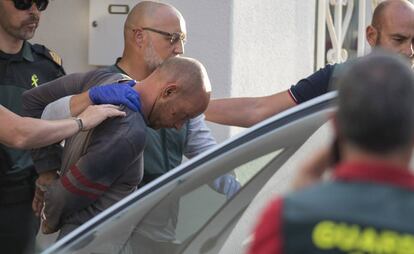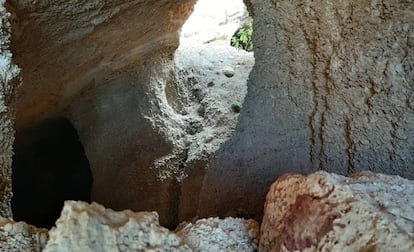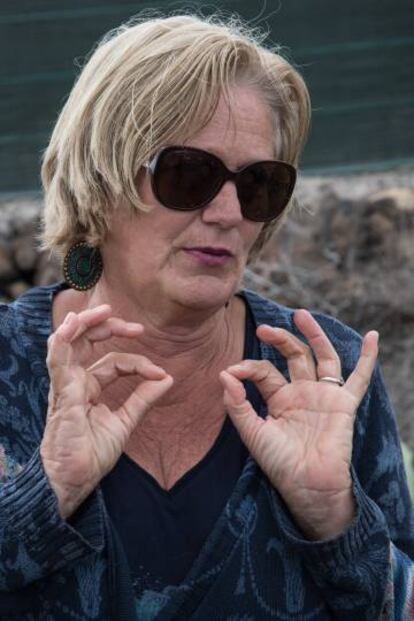Man who killed wife and son in Tenerife cave showing no remorse
The suspect has only spoken to ask for medication for his aching leg, but has shown no interest in his surviving son Jonas, leading investigators to believe the crime was premeditated

Jonas has been saving candy for his brother for several days. He has been temporarily placed in a home at an undisclosed location, waiting for relatives to pick him up, playing with other children who speak in a language he does not understand.
Jonas, who will turn eight in two weeks, was found among some bushes in La Quinta, a clutch of houses sitting in the high part of town in Adeje, on the island of Tenerife, a spot with spectacular views of the sea and the Teide volcano.
When somebody kills without premeditation, they typically confess
Investigators familiar with the case
Rosi Pérez, a local resident who found him looking “scared and sunburnt,” first thought he was a German child who had gotten lost walking in the hills.
In fact, the little boy had just run away from his father, Thomas Handrick, 43, who had tried to kill his entire family. Jonas managed to escape from the cave where his mother and older brother were beaten to death with stones.
Handrick’s residence is located in downtown Adeje, nine kilometers downhill from where Jonas was found. Investigators believe that it was inside this apartment, into which he moved two months ago, that Handrick planned how to kill his wife Sylvia Handrick, 39, and his two children Jakob, 10, and Jonas. “He wasn’t planning on leaving any of them alive,” said judicial sources.

The mother and children were living in Halle, a city in northeast Germany, but they flew to Tenerife on Monday of last week to spend some time with Thomas. The couple was separated and the father had been living in the town of Adeje, with a registered population of 47,280, for the last two years. He himself had never registered on the local census, and had no known job despite early reports that he worked as a cook. His neighbors, who hardly ever spoke with him, describe him as a reserved man who spoke just a little bit of Spanish and spent his days reading on the balcony.
Handrick rented a dark-blue van for the day trip he had planned for the family on Tuesday. All four of them got into the vehicle and he drove to a secluded area known as Ifonche, where he claimed to have hidden chocolate Easter eggs inside a cave. The cave was a three-hour walk away, and its particularly remote location has led investigators to presume that Handrick had probably been there earlier, and perhaps even picked out the stones with which he would attack his wife and children, said sources familiar with the case.
Their main theory is that he first killed Sylvia while the children attempted to defend her by throwing stones at their father, who had injuries on his right cheek when he was arrested. Afterwards, Jonas ran off and walked aimlessly all by himself, covering four kilometers until he showed up in La Quinta, dirty and sunburnt. The first person who spoke in German with him was Annelies B., a Dutch woman who lives in the area. Jonas told her he had avoided the road so as not to run into his father.
“The bodies of the mother and older brother were found at different spots inside the cave. They were very disfigured, and DNA tests were required to confirm their identities,” said Civil Guard sources familiar with the investigation. “The woman had sustained most of the blows, to her head and larynx. The child had many blows to the head and one on his back, and both showed signs of having defended themselves.”
Their main theory is that he first killed Sylvia while the children attempted to defend her by throwing stones at their father
Preliminary autopsy results confirmed a violent death from multiple cranial fractures, said judicial sources. Investigators have requested information from German authorities to find out whether Thomas Handrick has a criminal record, and to ask for his medical records. Until now, his only words have been to ask for medication for his leg, which he says hurts. He has refused to make any statements, and has not asked about his surviving child.
The judge at a courthouse in Arona specializing in violence against women placed the suspect in provisional detention on Friday after he refused to give a statement at his hearing, and he was sent to Tenerife II penitentiary in the northern part of the island. Prosecutors will seek a life sentence with a possibility of review.
Prosecutors in the German city of Halle have also initiated criminal proceedings. “The victims came from this city and had German citizenship, so we have opened a case,” said a spokesperson for the prosecution service in Halle. The same source said she did not know whether Sylvia Handrick had any family members in the city.
Premeditated
On Friday, the Civil Guard took Handrick back to his apartment to look for the medication. Neighbors received him with cries of “Murderer!” He still has marks on his right cheek from the struggle inside the cave.
The fact that he has not broken down at any point since his arrest is a sign that the crime was premeditated, not an impulsive act, say investigators. “When somebody kills without premeditation, they typically confess,” note experts on this matter.
It is unclear when Jonas will be able to leave the center where he has been temporarily placed. His aunt in Germany has talked to him on the phone, but his relatives are reportedly not coming to pick him up. They are said to be very intensely affected by the crime and have been told it is best not to travel. A German priest who is a friend of the family will likely be in charge of taking Jonas back to Germany, said sources at the Canary Islands social policy department.

Before that, the little boy will have to give one single statement, aided by psychologists and interpreters, which will be recorded. He will be asked what he saw before running from the cave. He has not yet been told that his mother and brother are dead.
When Jonas was younger he was interviewed for a corporate magazine published by his mother’s employer, a tech company named GISA. The article showcased Sylvia Handrick’s efforts to combine a career with family life. A smiling Jonas is seen posing for the camera with a ball, and he says that his mother “works on the computer and makes money so we can go on vacation.”
Jonas Handrick was initially the only clue the investigators had to finding the suspect. When he told them that the family had rented a car at an airport, investigators began showing him photographs of vehicles until he pointed at a model: a dark blue Volkswagen Caddy. It soon emerged that the rental company Hertz, which has an office at the southern airport of Reina Sofía, had rented such a vehicle to a German citizen on April 22. This led the police straight to Handrick’s home.
They found him in his pajamas, about to go to bed. He had injuries on his knuckles that suggested he had punched someone, and scratches on his face. This prompted the police decide to take him into custody. “I fell down a ravine and hurt myself when I grabbed some stones,” he told them.
English version by Susana Urra.
Tu suscripción se está usando en otro dispositivo
¿Quieres añadir otro usuario a tu suscripción?
Si continúas leyendo en este dispositivo, no se podrá leer en el otro.
FlechaTu suscripción se está usando en otro dispositivo y solo puedes acceder a EL PAÍS desde un dispositivo a la vez.
Si quieres compartir tu cuenta, cambia tu suscripción a la modalidad Premium, así podrás añadir otro usuario. Cada uno accederá con su propia cuenta de email, lo que os permitirá personalizar vuestra experiencia en EL PAÍS.
¿Tienes una suscripción de empresa? Accede aquí para contratar más cuentas.
En el caso de no saber quién está usando tu cuenta, te recomendamos cambiar tu contraseña aquí.
Si decides continuar compartiendo tu cuenta, este mensaje se mostrará en tu dispositivo y en el de la otra persona que está usando tu cuenta de forma indefinida, afectando a tu experiencia de lectura. Puedes consultar aquí los términos y condiciones de la suscripción digital.








































